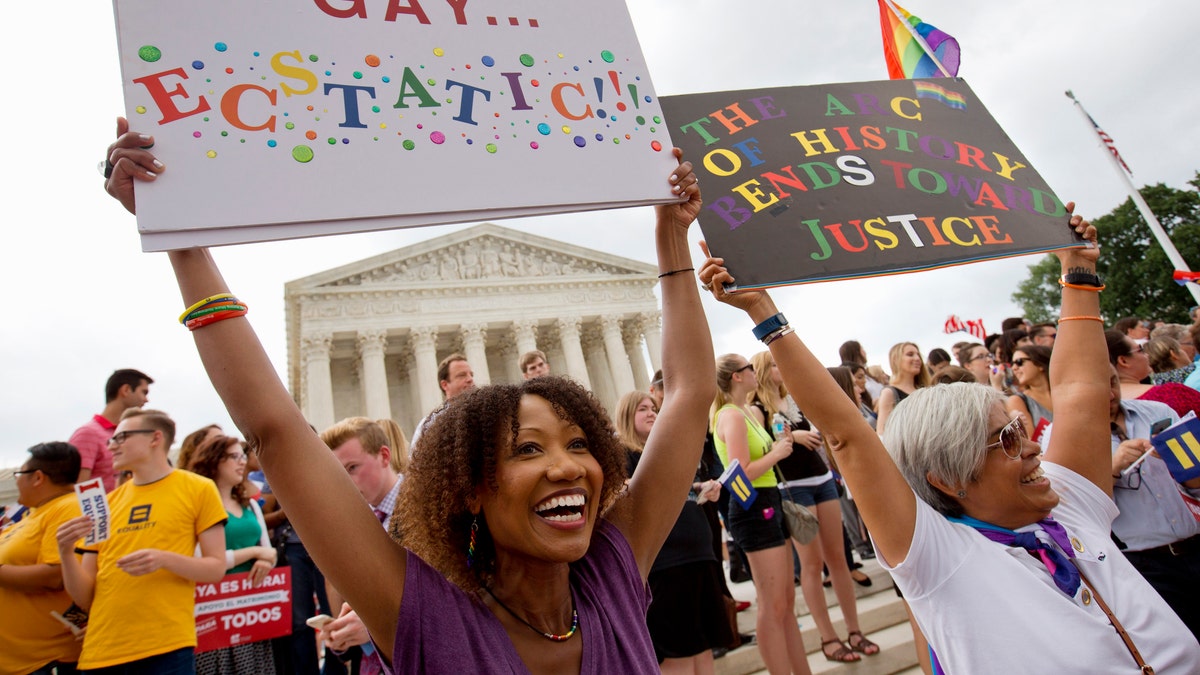
Ikeita Cantu, left, and her wife Carmen Guzman, of McLean, Va., hold up signs as they celebrate outside of the Supreme Court in Washington, Friday June 26, 2015, after the court declared that same-sex couples have a right to marry anywhere in the US. The couple was married in Canada in 2009 when gay marriage was illegal in Virginia. (AP Photo/Jacquelyn Martin)
Republicans rejoice! That sound you hear is the Tea Party brewing; you can thank the Supreme Court for turning up the heat.
Three different issues, all critical to conservatives: all went the wrong way. The Court not only gave ObamaCare new life, it also decided in favor of allowing dangerous “disparate impact” analysis to stamp out housing discrimination. Finally, the Court has ruled that same-sex marriage is now legal across the nation. If these three decisions don’t energize voters to elect a Republican president in 2016, nothing will.
First, on ObamaCare. Let’s be honest: Chief Justice John Roberts and his politically aligned brethren just did Republicans a big favor. In affirming that some six million Americans can continue to collect ObamaCare insurance subsidies, notwithstanding their residence in states that have failed to set up their own exchanges, and in spite of the letter and intent of the law, the Supreme Court saved the GOP from another embarrassing intermural shoot-out.
In the lead-up to the court’s decision, Republican presidential hopefuls had already trotted out competing plans for dealing with an expected blow to ObamaCare. Wisconsin Senator Ron Johnson led a group that wanted to allow for continued subsidies payments and a considered rewrite of the law in 2017, while others like Ted Cruz and Bobby Jindal were demanding total repeal of the Affordable Care Act, to be effective once President Obama is out of office.
Now, Republicans running for president can campaign on what continues to be an electric issue: rewriting our health care law. After untold speeches from our president and tens of millions of dollars spent by the White House on ObamaCare boosterism, the law continues to be unpopular. The most recent Real Clear Politics average of polls taken on the ACA shows 44% in favor of the law, 51% opposed.
A day before the 2014 election, in which Republicans took control of the Senate, pollster Scott Rasmussen called ObamaCare the “defining issue” of that political cycle. It was a rallying cry for conservatives across the country, even though the White House had purposefully postponed some of the bill’s least popular elements, in hopes of avoiding a rout. They delayed the employer mandate for companies with between 50 and 99 employees until 2016, and reduced the coverage requirement for bigger firms in 2015. Also, since President Obama’s promise that “If you like your health care plan, you can keep it," turned out to be PolitiFact’s Lie of the Year, the administration attempted damage control by giving people up to an extra two years to buy insurance that was compliant with the new law.
The White House also leaned on insurance companies to limit premium price hikes – all with a view to muffling voter outrage. To no avail. Democrats – even those who repudiated President Obama’s policies and tried to keep their distance – got crushed.
In the coming election, ObamaCare will again take center stage. Insurance companies are beginning the process of applying for premium hikes, and some are huge – substantially above 20% for various key providers in Illinois, North Carolina, Pennsylvania and Florida, for instance. As companies assess their results for the past year, they have a better idea of costs, which appear to have exceeded expectations. Also, the White House delayed phasing out a reinsurance program that compensated insurers for high costs and allowed them to keep premium hikes modest. The loss of that federal money will push rates higher.
As insurance prices soar, and more companies and individuals are forced to comply with ObamaCare mandates, Americans will head to the polls in 2016 looking for a candidate promising to make our health care law better.
They will also look for candidates vowing to protect private property rights and the rights of communities to enforce zoning and other policies that sometimes result in racially imbalanced neighborhoods. The court’s decision means that statistics alone are sufficient to define discrimination, even if that outcome is unintended. So, if two-acre zoning leads to high home prices, which in turn prove unaffordable for blacks or Hispanics, for instance, your town can be sued for discrimination. It’s a horror – not only to communities but also to lenders. The unintended consequence could well be another spurt of lending to people with low credit ratings by banks hoping not to be prosecuted for discrimination. We all know how that turned out.
The court’s third decision makes same-sex marriage legal in every state. It raises alarms over issues of religious liberty, for example throwing some doubt on the rights of religious schools to retain their tax exemptions. As Justice Alito pointed out during hearings on the issue, an earlier court once decided that a school could lose its tax exempt status if it opposed interracial marriage. It follows the same could hold for same-sex marriage, after today’s decision. Private businesses could also be impacted.
Though polling has found a gradual increase in the nation’s acceptance of gay marriage (the most recent Pew survey found 57% in favor, 39% opposed), there are millions of Americans who believe the traditional view that marriage is between a man and a woman. Acting according to their consciences could now put them in jeopardy.
All of these issues are controversial, and the Supreme Court has alarmed and angered millions of Americans with uniformly left-wing decisions. These rulings will work to remind voters that electing another Democrat president will likely further pack the court with liberal activists. But, the decisions will also give Republican candidates a boost, and give voters plenty of reason to turn out in 2016.
